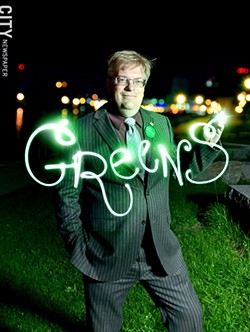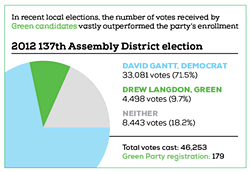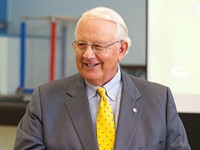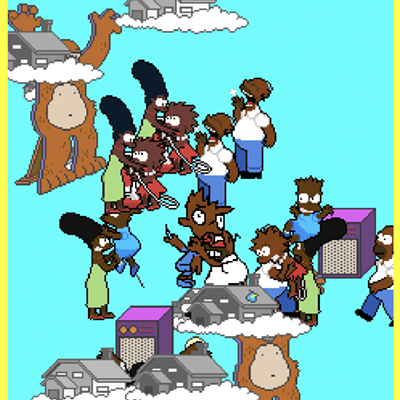[
{
"name": "500x250 Ad",
"insertPoint": "5",
"component": "15667920",
"parentWrapperClass": "",
"requiredCountToDisplay": "1"
}
]
Truthfully, Democratic mayoral candidate Lovely Warren doesn't have much to gain by debating her opponent, the Green Party's Alex White. With the exception of a few elected officials at the county and state levels, the City of Rochester is a Democratic lock. By agreeing to debate, Warren would elevate White to an equal — a worthy competitor. (Warren has said that she won't debate White.)
But for the local Greens, the whole point of running is to be taken seriously, both by candidates and by voters.
"It's about sending a message to the people of Rochester that we're legitimate, we're here, and we're here to work for you," White says.
And if the party can get at least one candidate elected this year, the Greens say, it'd send an even stronger message.
The Green Party of Monroe County's slate consists of White; City Council candidates David Atias, Drew Langdon, and Dorothy Paige running for three of five open seats; city school board candidate Lori Thomas running for one of three open seats; and Monroe County sheriff candidate Emily Good.
Conventional wisdom casts third parties such as the Greens as agitators who exist on the political fringe and can't really win elections; influencing the debate is the best that they can hope for. But local Greens vehemently reject that thinking.
The Greens are running to win, Atias says. And when the candidates are competitive, he says, they force their opponents and the public to pay attention to issues that they may otherwise ignore.
The Greens generally focus on topics such as protecting the environment and creating an economic structure that emphasizes communities and local enterprise over the wealthy and over large corporations. This year, local Greens have been particularly critical of the city's approach to development, especially the tax incentives given to deep-pocketed developers to build upscale housing.
The Greens also say that they provide inter-party opposition and competition that's otherwise absent in the City of Rochester. The Greens are running more people for office this year than the GOP, which has fielded few candidates in recent city elections. (This year, Mia Hodgins is running for city school board on the Republican line.)
"We are Rochester's second party, perhaps disproportionate to our membership," Langdon says.
And while the sheriff's race is countywide, Republican incumbent sheriff Patrick O'Flynn wouldn't have a challenger if not for Emily Good.
It's difficult to measure the influence that the Greens have had on local elections. The media haven't paid a lot of attention to their campaigns, and the candidates haven't spent a lot of time courting media attention (although White has held press conferences on education, crime, and other issues).
The Greens did get some coverage, however, when City Council was considering selling Midtown Tower to a partnership of Buckingham Properties and Morgan Management for $2. Green candidates protested by showing up at the City Council meeting and making their own offer for the property. (Council went ahead and approved the Buckingham-Morgan sale.)
The stunt was part of the Greens' broader campaign opposing tax breaks and loans for large residential developments. In addition to earning some news coverage, it put the campaigns of Lovely Warren and incumbent mayor Tom Richards in a position where they had to explain or defend the sale.
Former Rochester mayor Bill Johnson, a Democrat, says that the Greens do give voters a choice in city elections and that they encourage discussion around issues. Johnson, White, and Richards waged a three-way mayoral race in 2011. During that campaign, White pushed the idea of a municipal power company. Richards didn't support the idea, but at least the public got to hear the discussion, Johnson says.
Johnson says that the Greens field thoughtful candidates who bring solid ideas to their races (though he's clear that he's not endorsing them). But Johnson also says that sometimes, the Greens rail against problems without addressing underlying issues.
He says that while the Greens have attacked tax incentives for developers, he hasn't heard specifics about how they'd address vacant properties. (The Greens have talked about implementing homesteading programs and creating community gardens to address those issues.)
Some issues raised by the Green candidates don't seem to have gained traction with the other candidates in the races or with the public.
For example, sheriff's candidate Good is raising substantial issues related to mass incarceration. Good is a well-known local activist who's been particularly vocal about police misconduct and accountability.
Good entered the public eye after she was arrested while filming a Rochester police officer conducting a traffic stop; the charges were eventually dropped. She's also been arrested at protests, which means that she's spent some time — albeit minimal — in the county jail.
What she saw was a dehumanizing booking and holding process, she says. For example, she says, one women's holding cell is directly in front of a deputies' workstation and has a transparent front. Some women are in jumpsuits and have to strip down to use the toilet's cell, Good says.
Good is also concerned about the medical care at the county's jail facilities. And she questions why the county has maintained its jail health services contract with Correctional Medical Care.
Earlier this year, the Albany Times Union published a lengthy article highlighting ongoing concerns from the state Commission of Corrections about for-profit jail health care companies, including Correctional Medical Care.
The Times Union obtained a state report about a 2009 inmate death at the county jail, which included a recommendation that the county terminate its contract with CMC. But the contract persists, according to CMC's website. (O'Flynn's campaign did not respond to requests for comment.)
Good says that she also wants the sheriff's office and the courts to make more use of restorative justice programs. And that she wants to replace the DARE programs in local schools with programs that teach conflict resolution skills.
Good says that as sheriff she'd advocate for drug law reform at the state and federal levels.
But Good's campaign has been relatively low-profile. She's made appearances at forums and events, and has talked to bus riders waiting at stops downtown. But she says that she doesn't have a large number of volunteers or a significant campaign operation to work on her behalf.
"The people who I do manage to talk to, I have really great conversations with the majority of the time," she says.
And Good's campaign hasn't had a perceptible influence on her opponent. O'Flynn has also kept a relatively low profile.
The Green Party has a numbers problem. Countywide, its enrollment pales in comparison to the Democratic and Republican parties, and even the Conservative and Independence parties.
The county's approximately 1,100 registered Greens equal less than 1 percent of either registered Republicans or Democrats. Since the end of 2011, however, the party's enrollment has been growing, marking an important shift after several years of declines.
And in recent elections, Green candidates have performed at levels disproportionate to the party's enrollment. White received 2,221 votes in the 2011 mayoral special election — approximately 9 percent of the 25,726 cast. And in a 2012 challenge against Democratic Assembly member David Gantt, Drew Langdon received 4,498 votes, or almost 10 percent of the 46,253 cast.
The Greens say that they hope that running fuller slates, as they are doing this year, will convince more people to enroll as or to vote for Greens. And that'll be crucial headed into the 2014 gubernatorial elections. The Green candidate has to receive a certain number of votes for the party to keep its official state recognition for the subsequent four years. That recognition makes it easier for the party to get its local and statewide candidates on the ballot.
But to grow the Greens ranks, the party also has to do outreach, which is where campaign tactics come into play.
And while the Greens say that they are frustrated by their exclusion from media-sponsored debates, they are encouraged that community groups are inviting their candidates to forums and meetings.
"They want to hear our ideas," Council candidate Atias says. "Will some of the folks who were there vote for us? I don't know. I think so."
And former mayor Johnson also has some advice for the Greens on growing their party and influence. He says that they need to keep speaking out on issues after the elections are over.
The big-party candidates have many paths to reach voters, such as paid advertising and polished websites. They also harness substantial volunteer networks to knock on doors and to staff phone banks.
But many outreach efforts require money, and in that, the Greens are lacking.
Instead, this year's slate is running campaigns that are, in a sense, more traditional. The candidates knock on doors and talk to anyone who will listen. They also go to community gathering places like the Public Market to engage potential voters.
And they've embraced social media as a means to connect with voters and to spread their message.
But they're also trying their hands at an unconventional approach. Over the summer, the Greens began holding interactive Livestream events, where candidates had free-wheeling conversations devoted to various issues. Viewers could join in the discussion. For example, Good and Langdon held a Livestream in August devoted to criminal justice and public safety issues.
The candidates continue to hold Livestreams each Tuesday — an approach that gives them a direct connection to voters, sans filter.
The Greens say that they want to win elections, but that they also have different ways of measuring success. Increasing the number of registered Greens is one measure, they say, and keeping their state recognition is another. In the longer term, building a party that is an active and meaningful participant in city elections would be an important milestone, they say.
"A victory is going to look like people having better lives," White says. "That's what success in politics should be."
In This Guide...
Speaking of...
Latest in Elections
More by Jeremy Moule
-

ROCHESTER TEN
ANNETTE RAMOSAug 1, 2023 - More »














